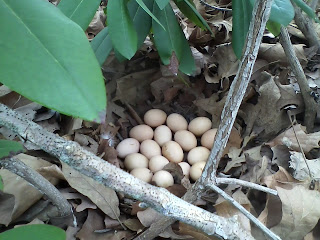 |
| Dottie on her rhododendron nest |
Last Fall, we rescued our Wyandotte chicken and her friend the Speckled Sussex from mistreatment at the beaks of the Delaware chickens who don't seem to get along well with other breeds. We moved them into the brooder house to recover and they began free ranging wherever they pleased, returning to the brooder house each night to roost. However, a month or so ago, eggs stopped appearing daily in the nest boxes we'd put into the brooder house for their use. Unbeknownst to us, Dottie had scoped out a new nesting area. We found her one day sitting beneath a rhododendron bush in the front yard (as pictured above). When she got up, we were amazed by the nest full of eggs she had accumulated--18 in all before she was discovered!
 |
| Rhododendron nest full of eggs! |
 |
| Rhododendron nest emptied of eggs |
We moved the eggs to the nesting boxes in the brooder house, hoping Dottie would change her mind and return to laying in a more conventional spot.
 |
| Egg cache in the nest box in the brooder house |
Although Dottie returned to the rhododendron bush for 2 days to lay, the eggs were gathered each time they appeared and Dottie soon stopped visiting the no-longer-secret nest. Although the nest in the rhododendrons was not being used, Dottie would also not use the nest boxes in the brooder house. She and Speckerella (the Speckled Sussex) have been relocated to a small coop with 4 other pullets. Dottie is now happily living and nesting in the small chicken coop. She and Speckerella seem to have taught all of the others to roam but, fortunately, they favor the compost pile and the pastures rather than the front yard near the road--and the rhododendron bush. Perhaps Dottie is learning from them as much as she seems to be teaching. The added benefit to us by having 6 "yard" chickens is fewer bugs all over the yard as the chickens devour all they find.
 |
| Rhododendrons without any signs of nesting |





